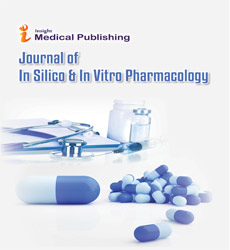Omega-3 Fatty Acids and Cardiovascular Disease: A Narrative Review for Pharmacists
Olivia Taylor
Olivia Taylor*
Managing editor, In Silico & In Vitro Pharmacology, London, UK- *Corresponding Author:
- Olivia Taylor
Managing editor
In Silico & In Vitro Pharmacology
London
UK
E-mail: aylorvia546@hotmail.com
Received Date: May 10, 2021; Accepted Date: May 24, 2021; Published Date: May 31, 2021
Citation: Taylor O (2021) Omega-3 Fatty Acids and Cardiovascular Disease: A Narrative Review for Pharmacists. In Silico & In Vitro Pharmacol Vol.7 No.3:4.
Introduction
The most common cause of morbidity and mortality worldwide is Atherosclerotic Cardiovascular Disease (ASCVD). Despite achieving target Low-Density Lipoprotein Cholesterol (LDL-C) levels, statin medication has been proven to reduce the risk of Cardiovascular (CV) events by 25%-45%. However, residual risk persists. Independent of LDL-C management, hypertriglyceridemia is linked to an elevated risk of ASCVD. Approximately 25% of persons in the United States (US) have increased Triglyceride (TG) levels (150 mg/dL), with up to one-third on statin medication. On a pharmacological level, statin medication has a minor influence on decreasing TG levels. Niacin, fibrates, ezetimibe, and mixed Omega-3 (OM-3) fatty acids are some of the current treatments for decreasing TG levels. However, as an addition to statin therapy, these medicines have not shown consistent ASCVD risk reduction in large CV Outcome Trials (CVOTs). Omega-3 fatty acids are one of the most widely prescribed supplements, having a significant global market. People spent around $25 billion on omega-3 supplements in 2011. In 2016, this figure is expected to reach $35 billion. While these supplements have been used to treat a variety of medical diseases, including gastrointestinal, rheumatic, mental, metabolic, renal, dermatologic, and pulmonary issues, they are most typically used to avoid Cardiovascular Disease (CVD).
Method
Icosapent Ethyl (IPE) is the ethyl ester of Eicosapentaenoic Acid (EPA), an OM-3 fatty acid, is highly refined and stable. The US Food and Drug Administration (FDA) first approved IPE as a supplement to dietary changes to lower TG levels in adult patients with severe hypertriglyceridemia (500 mg/dL). The Reduction of Cardiovascular Events with Icosapent Ethyl-Interventional Trial (REDUCE-IT) discovered that combining IPE with statin therapy in adults with higher TG levels (150 mg/dL) and a high risk of ASCVD events resulted in a significant risk reduction when compared to statin therapy alone. As a result, the US FDA increased IPE's indication to include usage as an addition to maximally tolerated statin therapy in adult patients with elevated TG levels to lower the risk of Myocardial Infarction (MI), stroke, coronary revascularization, and unstable angina necessitating hospitalisation.
Both eicosapentaenoic acid and docosahexaenoic acid have been linked to a variety of health advantages; however, data on the effect of combining eicosapentaenoic acid and docosahexaenoic acid in patients with cardiovascular disease is inconclusive. In statin-treated patients, eicosapentaenoic acid, specifically icosapent ethyl, has been shown to reduce the risk of atherosclerotic cardiovascular disease. There are significant clinical differences between dietary supplement omega-3 fatty acid products and prescription omega-3 fatty acid products.
Conclusion
Additional medication beyond statins is needed to lower the risk of atherosclerotic cardiovascular disease while research into the best management of dyslipidaemia continues. Eicosapentaenoic acid has been shown to improve cardiovascular outcomes in big trials. Icosapent ethyl has a good efficacy and safety profile and should be used in conjunction with statin therapy to lower the risk of ischemic events.
Open Access Journals
- Aquaculture & Veterinary Science
- Chemistry & Chemical Sciences
- Clinical Sciences
- Engineering
- General Science
- Genetics & Molecular Biology
- Health Care & Nursing
- Immunology & Microbiology
- Materials Science
- Mathematics & Physics
- Medical Sciences
- Neurology & Psychiatry
- Oncology & Cancer Science
- Pharmaceutical Sciences
